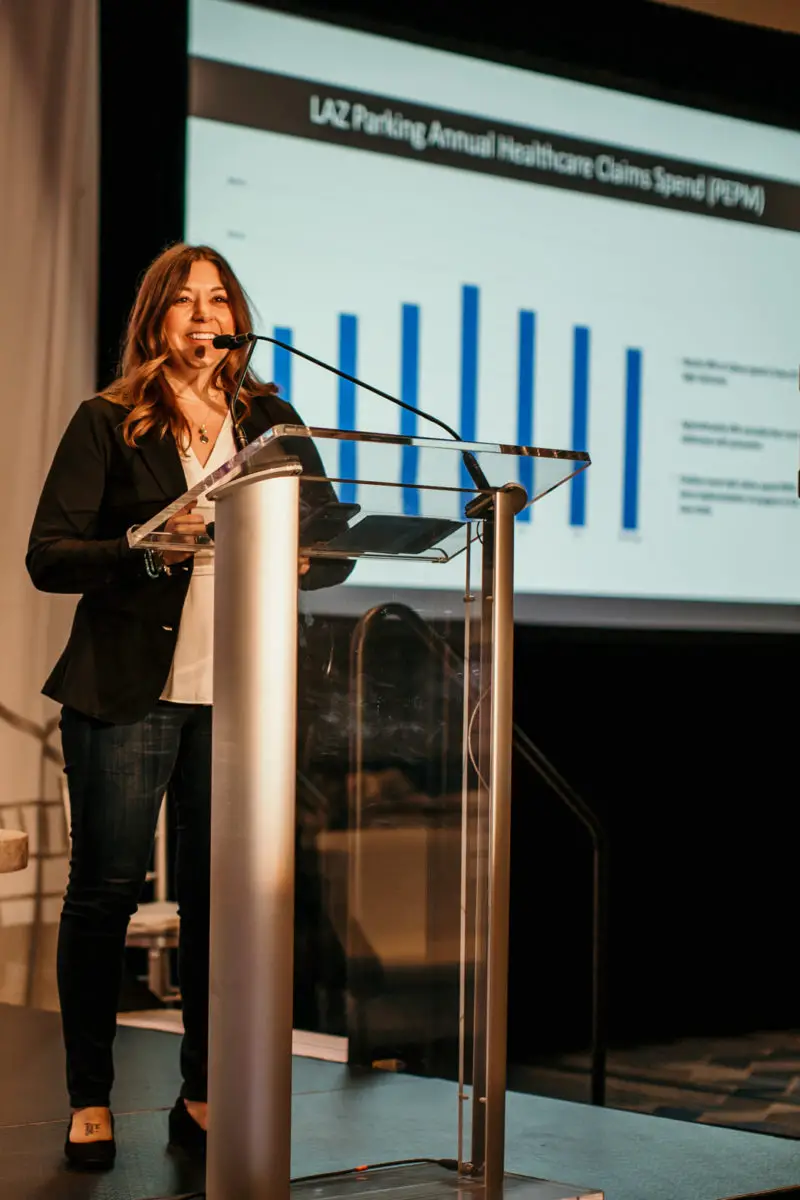One of the nation”™s largest parking companies has partnered with a ConnectiCare subsidiary to develop what it calls a “next generation employee benefit program” designed to improve employee health and its financial bottom line.
“For the last few years, we”™ve realized how hard it can be to navigate the health care system,” said Andi Campbell, senior vice president of human resources at LAZ Parking. “And it was not just for our frontline workers, but for our more educated senior staff as well.”

The Hartford-based company, which operates lots throughout Fairfield County, hired a pair of full-time life coaches to help employees better manage their own health as well as the ins-and-outs of the ever-shifting health care system.
“But we didn”™t have the technology to take it to the 2.0 level,” Campbell said. “We wanted to be able to dig into our claims data and be more proactive in identifying people who were in, or were on the verge of being in, the chronic disease category.”
While one tech company could handle the data mining, “it just wasn”™t enough,” she added. “We kept looking for someone who could help us with everything we were looking for, and eventually I was introduced to Bert.”
That would be Roberta Wachtelhausen, president of WellSpark Health. Part of ConnectiCare, WellSpark offers a program powered by Silver Fern Healthcare”™s proprietary behavior diagnostic toolset to address the unique bio-psycho-social aspects of each individual. Using data to create customized programs, WellSpark achieves what Wachtelhausen calls “an outside-of-the-box, single-point solution.”
“Are there other companies that do what we do? Yes and no,” she said. “They might focus on weight loss or controlling high blood pressure, but we feel that you have to look at the whole person ”” their physical, psychological and social health.”

While WellSpark”™s diabetes prevention program has been recognized as exceeding national averages of traditional CDC programs, yielding increased average weight loss and reduced A1c levels, it can reach further by providing emotional support and helping to solve multiple business issues associated with the health of a workforce. These include the cost of absenteeism related to illness, disability and workers compensation, Wachtelhausen said.
Campbell said the approach fits well with LAZ”™s dedication to “conscious capitalism,” the concept created by Whole Foods co-founder John Mackey and marketing professor Raj Sisodia. That approach revolves around the idea that companies should operate ethically while pursuing profits, and that they should try to serve all of their stakeholders ”” not just management and shareholders, but also employees, the environment and humanity at large.
“The bottom line is that we are providing a better set of tools and education to our workforce,” Campbell said. “A lot of our employees come from different places around the world, so there can be language barriers and customs when it comes to seeking health care that are different than what we have here. We feel that this is part of our responsibility as an employer, and that it”™s the right thing to do.”
The Covid-19 pandemic has further strengthened LAZ”™s resolve, she said; the company has furloughed hundreds of employees around the country and is now in the process of hiring many of them back. Working with WellSpark, LAZ is redesigning its health program for 2021, including measures that can help reduce a worker”™s insurance costs through engaging with a number of educational initiatives. Those encompass virtual meetings with health care coaches, watching instructional videos and regularly visiting their physicians.
“We can”™t force them to go into our plan,” Campbell said. “But we had a 93% enrollment at a time when we thought our target of 90% was aggressive.”
“There are two soft spots where these types of programs typically fall down,” Wachtelhausen said. “One is employee engagement. You can”™t just roll a ball out on the playground and expect people to play. You have to identify what will really work with your workforce, the how”™s, why”™s and when”™s. It really has to be a joint effort ”” clearly, if we succeed, our client succeeds too.
“The other thing is measurement,” she continued. “It”™s the return-on-investment question ”” what does the client get out of this?”
That is where cutting down on illness-related absenteeism comes into play, both women said. “It”™s the ”˜say, stay and strive”™ approach,” Campbell said. “You want your employees to say good things about you as a company, have them stay with you, and strive to help them achieve their goals.”
As a parking company ”” one that operates over 1.2 million parking spaces in over 3,100 locations around the country ”” LAZ has its share of work-related injuries, she said; having strong health practices in place can help them to recover more quickly.
“Even if they”™re not enrolled in our program,” Campbell said, “we take the approach of, ”˜Why not apply the same healthy practices?”™”






















